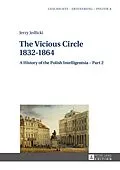The three-part work provides a first synthetic account of the history of the Polish intelligentsia from the days of its formation to World War I. Part two (1832-1864) analyses the growing importance of the intelligentsia in the epoch marked by the triumph of the Polish romanticism. The stress is put on the debates of the position of intelligentsia in the society, as well as on tensions between great romantic ideas and realities of everyday life. A substantial part deals with the genesis, outbreak and defeat as well as the consequences of the national uprising in 1863, whose preparation was to a high degree the work of the intelligentsia. The work combines social and intellectual history, tracing both the formation of the intelligentsia as a social stratum and the forms of engagement of the intelligentsia in the public discourse. Thus, it offers a broad view of the group's transformations which immensely influenced the course of the Polish history.
Autorentext
Jerzy Jedlicki is Professor emeritus at the Institute of History at the Polish Academy of Sciences where he was head of the research group for the history of intelligentsia. He also was a fellow at the Woodrow Wilson Center in Washington D.C.
Inhalt
Contents: Birth of the Intelligentsia - After the partitions of Poland: Intellectuals in a divided state - Modern state institutions and the intellectuals - Insurrections or gradual change? - The intelligentsia's sense of mission - After 1863: reactions to the national catastrophe - Intelligentsia and the modern party politics (turn of 19 and 20 centuries) - Early 20 century: intelligentsia and the growth of mass society.
